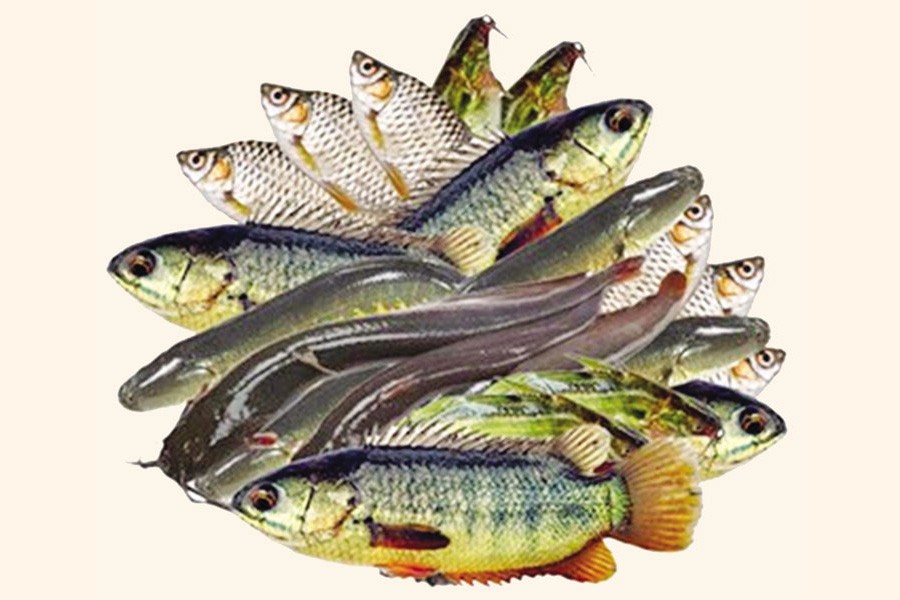This deltaic low land has been home to innumerable species of sweet water fish. So rice and fish have been the two most popular food items to define the Bangalee's Bangaleeness. But many of the fish species of natural water started disappearing with the aggressive cultivation of high yielding varieties (HYV) of paddies that necessitated regulation or diversion of monsoon water in and from an entire zone. In range and scope monsoon flooding shrank, leaving hardly any natural habitat in many areas for spawning and growth of fish fries in natural environment.
Also a large portion of the huge amount of fertiliser and insecticide used every year for paddy and vegetable cultivation get channelled into the natural water systems for deposition. Thus the local fish species started finding it a hostile habitat for their living and breeding. Many species either disappeared or were on the verge of extinction. It is because of this, the Bangladesh Fisheries Research Institute (BFRI) had to intervene in order to save them from decline and disappearance.
Of the 265 freshwater species of fish, 140 are small indigenous varieties. Actually they have unique tastes and nutritious value. Their disappearance means little or no supply of tasty dishes with high nutrition to the Bangalees' dining table. The good news is that BFRI's tireless research and experiment have so far successfully saved 31 out of 64 endangered small fish species through aquaculture. Some of the fish that disappeared from the fish market have now staged a comeback courtesy of such fish farming.
Many of these fish released in natural water bodies such as rivers, haors, beels and canals are also spawning there and the fish population in some controlled areas is rising. But this is not the case all across the country particularly where natural water bodies are few and far between. This year has seen little rain in this country during the entire monsoon. The areas naturally used to get submerged did not come under water and its effect on breeding of the small local fish species has been devastating.
Either in rural markets or in the capital's fish market the local varieties of fish that were supposed to be available at this time of receding water are conspicuous by their absence. Fishermen point accusing fingers at the rainless monsoon for the dearth of the many delicious food stocks.
Sure enough, freshwater is no longer freshwater. But at least abundance of water during the monsoon makes it clean to a large extent. This year, this process has been seriously hampered because the water was more or less like a stagnant pool without the strong current. This is a completely new phenomenon for Bangladesh. Most likely this is not an isolated incident; rather it is related to the big issue of global climate change.
Climate has almost all through the year been in turmoil. Most parts of the planet have experienced unprecedented weather patterns and their consequences. Many of the world's famous rivers have lost water and a few had their sources dried. Bangladesh did not experience rains in the monsoon but in the autumn, there were rains more than were expected or usually occur.
A small country, Bangladesh --- in fact no country --- can do much about this seasonal behaviour. But then some developments in the form of human can be taken care of. That the country's water bodies have fallen victim to land grabbers is known to all. The government even had to form the National River Conservation Commission. The commission has made some progress in identification of river areas but much needs to be done. Unfortunately, the commission has neither enough power nor fund to go about the business of making its mission successful.
Then there is the need to recover other water bodies either totally vanished or still announcing their presence somehow. Again, there is a threat to the freshwater fish yet to be taken very seriously. This comes from two deadly types of snares called current nets and chinaduari. These are nets that---particularly the latter --- suck in them the smallest aqua organisms let alone the fish fries. There is a need for launching a countrywide social campaign against the use of such nets. At the same time the local administration should initiate regular drives against those fishing with such environmentally hostile nets. If this type of fishing cannot be stopped, no freshwater indigenous small fish will be left to survive.

- Saturday, 21 December 2024 |
- Today's FE |
- e-Paper |
- Beta Website

